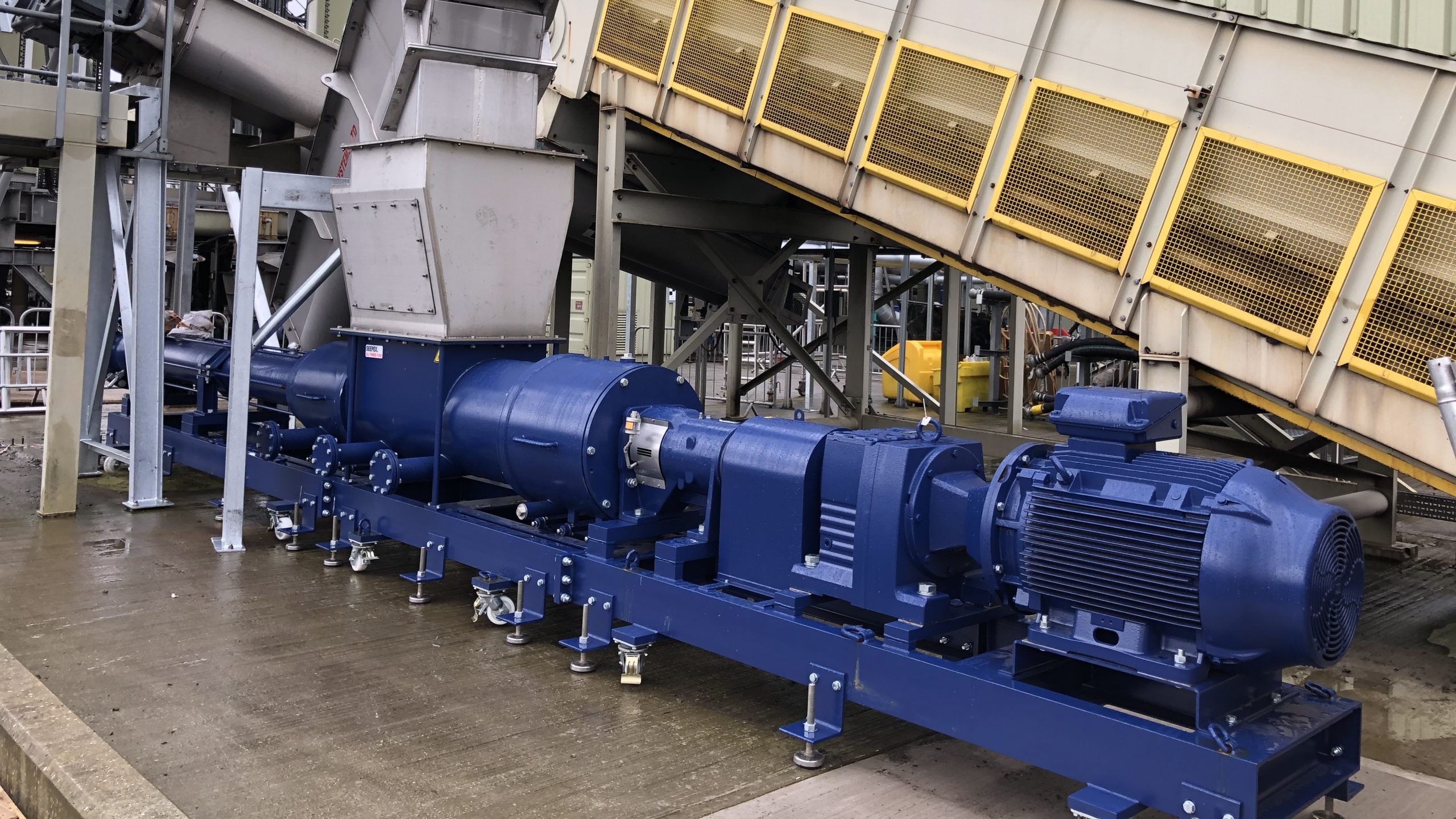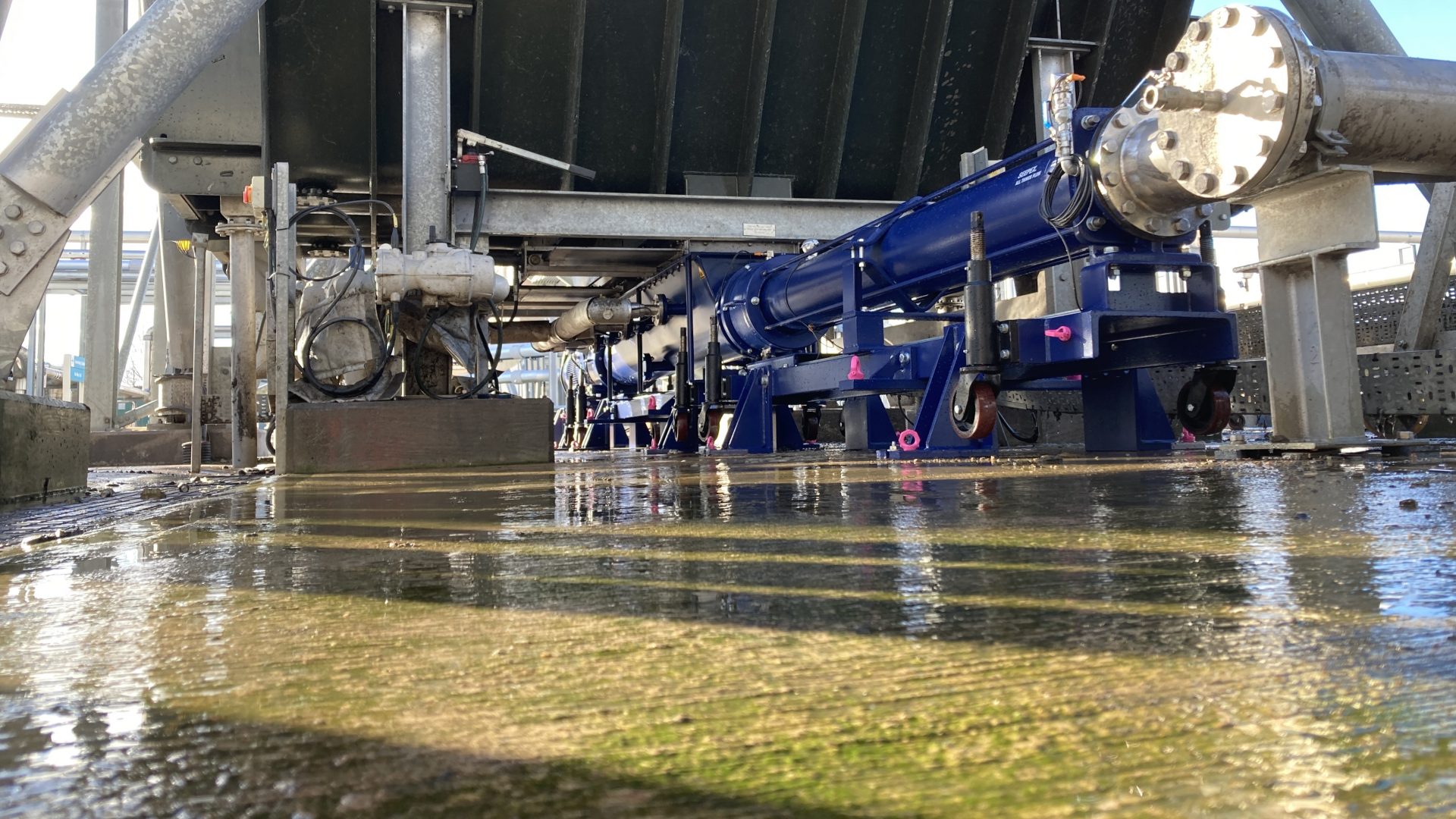According to government sources, there are 7,078 sewage treatment works (STW) in England and Wales, and 10,814 STW in Scotland and Northern Ireland.
Pumping and storing sludge cake during the wastewater treatment process can be costly, driving water companies to technologies that reduce their volume to minimise such costs.
This can be achieved through conventional Anaerobic Digestion (AD) or through Advanced Anaerobic Digestion (ADD) processes, such as Thermal Hydrolysis Process (THP). ADD can reduce the volume of solids and increase the yield of biogas used to power engines. This can make plants energy self-sufficient or generate income by exporting power to the National Grid.
Anglian Water’s Cotton Valley
At Cotton Valley Sludge Treatment Centre (STC), one of Anglian Water’s ten main STCs, competitor’s progressive cavity pumps were installed to back mix the dewatered sludge and pump it into the THP. The two pumps were costing overall circa £100K per annum due to rotor and stator changes every 3-6 months.
Their inability to transfer no more than 3.5m3/h (bottleneck and limiting biogas production) meant the site was not able to meet the design criteria limiting the amount of imported raw cake being handled to only 120 tonnes per day. Additionally, before pump maintenance could be carried out, the silo had to be emptied. This also meant cake imports from satellite sites had to be diverted, which resulted in substantial logistical costs.
SEEPEX supplied and installed two custom-made open hopper pumps with a dimensionally identical hopper to fit within the same footprint of the original pumps whilst delivering over 55% increased throughput capacity from 3.5m3/hr to 5.5m3/hr.
Prior to the installation of the new pumps, Anglian Water was processing approx. 120 tonnes per day of imported sludge cake with both pumps running. With the new pumps installed, the customer is now able to exceed this by 50% (from 120 tonnes up to 180 tonnes) whilst maintaining the same footprint and motor size.
“Due to the reliability and performance of the new SEEPEX pumps there is an increase in uptime of the cake import facility at Cotton Valley,” explains Luke Fish, Production Manager at Anglian Water. “This has not only allowed us to increase the sludge throughput on site and therefore generate more biogas but has also given us significant savings in logistics and raw cake storage costs.”

At a Major Advanced Digestion plant in the UK
Existing competitor’s progressive cavity (PC) pumps at a large AD plant were unreliable, causing downtime to the thermal hydrolysis streams. When the THP feed pumps were offline, this affected production and biogas generation. To address this, SEEPEX delivered a custom-made open hopper PC pump fitted with Maintain-In-Place technology to replace the original pump, incorporating condition monitoring and digital solutions.
SEEPEX Maintain-In-Place technology includes Rotor Joint Access (RJA) and Drive Joint Access (DJA) which simplifies maintenance and improves availability of equipment. To complement these features, the pump’s baseplate is manufactured in three pieces (on wheels) which enables individual sections of the pump to be removed for maintenance or major overhaul.
SEEPEX Digital Solutions facilitate preventative maintenance, equipment availability and process optimisation, which has a direct impact on reactive costs and biogas production – contributing to net zero objectives and increased sustainability.
Since installation, there has been zero downtime and no drop off in performance, and the sludge handling process has gained resilience.
At another Major UK Thermal Hydrolysis Plant
SEEPEX open hopper pumps were used to replace unreliable chain conveyor systems. These pumps are used in two applications. Firstly, to transport the imported dewatered sludge from the imported belt facilities at a capacity of up to 75 m3/h with dry solids up to 32% to either of the two pre-THP silos, enabling a 20-minute turnaround time for the trucks to unload and prevent backlog of vehicles. Secondly, to transport the indigenous dewatered sludge from the four decanting centrifuges to a third pre-THP silo.
Pump maintenance is carried out at ground level, improving health and safety issues associated with working at height with the previous conveyor installation. In addition, with the new SEEPEX pumps, the site now benefits from increased availability of their THP streams with subsequent improvements in gas yield.
The Key: Reliability and Right Feedstock
To achieve the full benefits of advanced digestion by thermal hydrolysis requires reliable and efficient delivery of feedstock to the process. SEEPEX solutions combine back mixing expertise with open hopper PC pump technology to both transfer and blend imported and indigenous dewatered sludges to the precise DS % content. This ensures optimum digestion and maximises biogas production, reducing carbon footprint.



